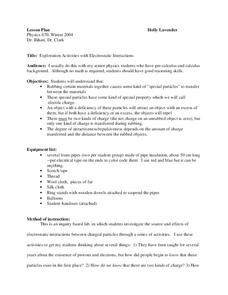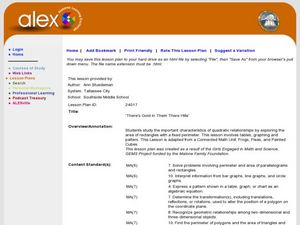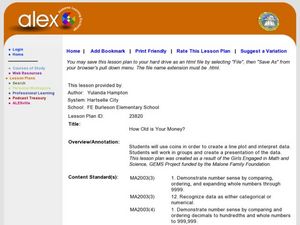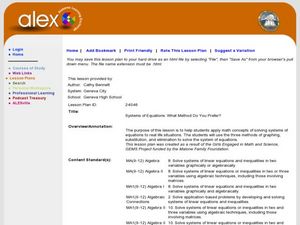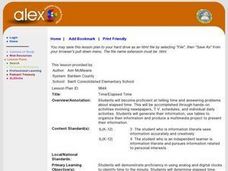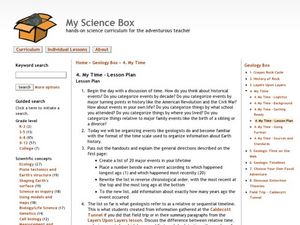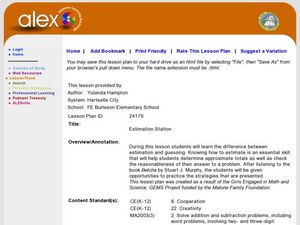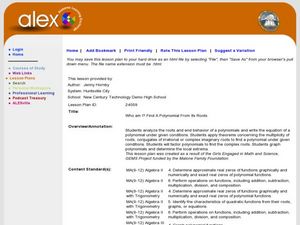Curated OER
Dance Challenge: Calculate and Compare Speed by Measuring a Series of Dance Movements
Really neat! Kids choreograph a dance phrase and then measure the distance and speed of the phrase using a timer and a meter stick. They collect the data on a table which they use to determine an average. A series of observation and...
Ohio State University
Exploration Activities with Electrostatic Interactions
Step out of the 21st century and discover protons and electrons through observation. Using common materials, participants continually adjust their explanation of charges. The final assessment requires pupils to design their own...
Curated OER
Twirly Whirly Milk
Student observe the effect soap (or detergent) has on the movement of food color in milk. Pupils observe the properties of solids and liquids while making butter. They read a poem, Shaking, and listen for ryhming words. Studdents...
Teach Engineering
Considering Trade-Offs and Maximizing Efficiency in a Fast Food Restaurant
Make fast food restaurants even faster. Groups consider trade-offs when maximizing efficiency in fast food restaurants. Restructuring schedules and floor plans, as well reassigning job duties, all fall under this directive.
Alabama Learning Exchange
There's Gold in Them There Hills
Need to build a laser fence on Mars? For this cute maximizing-area lesson, young explorers pretend to be prospectors on Mars and must determine the best way to use 20 meters of fencing in order to maximize their area. In addition,...
Alabama Learning Exchange
How Old is Your Money?
Elementary learners explore coin mint dates. First, they listen to the book Alexander Who Used to be Rich Last Sunday by Judith Viorst. They then sort a collection of coins according to their mint date and put them in order from oldest...
Alabama Learning Exchange
Understanding Fractions
Young learners explore fractions and demonstrate parts of a whole by using a candy bar and a piece of paper and dividing both into equal parts. Included is a worksheet that requires youngsters to color in half of each polygon shape. Some...
Alabama Learning Exchange
Jump! An Exploration into Parametric Equations
Explore parametric equations in this lesson, and learn how to determine how much time it takes for an object to fall compared with an object being launched. high scoolers will use parametric equations to follow the path of objects in...
Curated OER
Systems of Equations: What Method Do You Prefer?
Students explore the concept of solving systems of equations. For this solving systems of equations lesson, students watch YouTube videos about how to solve systems by graphing and by elimination. Students use an interactive website to...
Curated OER
Time/Elapsed Time
Young mathematicians complete various activities to demonstrate proficiency in telling time and identifying elapsed time. They analyze and discuss television schedules, create a booklet about their daily activities, produce a TV. guide,...
Alabama Learning Exchange
Wheels All Around
Budding mathematicians explore the concept of skip counting. They practice skip counting as they use it to determine the number of wheels that come to school at 3 different times throughout the day. They also create a data graph to show...
Alabama Learning Exchange
Time to Tell Time
Students demonstrate how to tell time using an analog clock. In this time measurement lesson, students read the book Clocks and More Clocks and use analog clocks to demonstrate the time that the teacher called out.
Alabama Learning Exchange
Miss Integer Finds Her Properties in Order
Access prior knowledge to practice concepts like order of operations and exponents. Your class can play this game as a daily review or as a warm-up activity when needed. They work in groups of four to complete and correct review problems.
Alabama Learning Exchange
Polygons-Changing Area Versus Changing Perimeter
Investigate the area and perimeter of polygons in this geometry lesson. Young geometers use grid paper to draw a quadrilateral and calculate its area and perimeter. They also read The Greedy Triangle to identify the changing shape of...
Curated OER
My Time!
Learners explore how to tell time by looking at their daily schedule. Everyone's days start out the same (with school), but what does each learner do after school? How do they spend their time?
Alabama Learning Exchange
Estimation Station: Why Estimating is Better than Guessing
Youngsters discover the difference between estimating and guessing. They estimate how many items are contained in a jar as they read a story. After the story, pupils discover the differences between estimating and guessing and create a...
Alabama Learning Exchange
Ice Cream Sundae Survey
Young scholars analyze data through graphs. They will complete a class survey on ice cream sundaes and tally and graph the responses. They then analyze the information from the class graph.
Alabama Learning Exchange
Straight Line Motion
Students examine gravity, mass, and friction. In this speed and motion instructional activity, students investigate how straight line motion is impacted by gravity, mass, and fiction as they participate in a hands-on activity.
Alabama Learning Exchange
Twisted Tangrams
Primary geometers create a picture using tangrams. In this geometry lesson, students read Grandfather Tang: A Tale Told with Tangrams, cut out their own tangrams, and choose a character from the story to make using their tangram pieces.
Curated OER
Home Living/ Daily Living: Food Pyramid
What did you have for lunch? Did it contain all four food groups? Help your special education class make good food choices and recognize foods in each of the four food groups. They look at images and discuss the foods on the food pyramid...
Alabama Learning Exchange
Exponents and Division
Create a human fraction to learn about division of exponents. Scholars develop the rule for division of exponents by being part of a human fraction to explore and justify the rule. They also consider zero exponents and negative exponents.
Alabama Learning Exchange
Color This Polynomial Simplified
Help learners use a variety of methods to identify, visualize, and simplify polynomials with like terms. Several different visuals are used to introduce the instructional activity, such as colored pencils, overheads, interactive white...
Alabama Learning Exchange
Human Slope
Middle and high schoolers explore the concept of slope. In this slope lesson, learners graph lines using a life-size graph. They use chalk on a blacktop to create a coordinate plane and use each other as the tick marks on the grid....
Curated OER
Who am I? Find A Polynomial From Its Roots
High schoolers generate the equation of a polynomial given its roots and the end behavior of the function. They need to apply theorems concerning the multiplicity of roots, conjugates of irrational or imaginary roots to find a...

